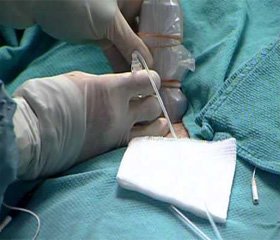Журнал «Медицина неотложных состояний» 2 (65) 2015
Вернуться к номеру
Single-shot femoral nerve block with 0,25% bupivacaine after arthroscopic anterior cruciate ligament reconstruction
Авторы: Tutunnik A.G. - Department of Anaesthesiology and Intensive Care Medicine of Dnepropetrovsk State Medical Academy
Рубрики: Медицина неотложных состояний
Разделы: Клинические исследования
Версия для печати
Background: Episodes of severe postoperative pain after arthroscopic anterior cruciate ligament reconstruction increase in hospital stay and decrease quality of life in spite of widely used regional anesthesia, local anesthetics and routs of administrations. Single-shot femoral nerve block with 0.25% bupivacaine is simpler and time consuming than continuous nerve blocks but has only limited period of action. It remains unclear, whether single-shot femoral nerve block with 0.25% bupivacaine combined with systemic analgesia is effective in lowering pain after these operations.
Aims: The aim of the present study was carried out to compare the efficacy of single-shot femoral nerve block with 0.25% bupivacaine in controlling pain after arthroscopic anterior cruciate ligament reconstruction.
Materials and methods: In years 2013-2014, 40 patients of both sex, of American Society of Anesthesiologists physical status I and II, undergoing arthroscopic anterior cruciate ligament reconstruction were randomly assigned in two groups (I and II). Operations were performed under spinal anesthesia with 1.5 ml of 0.5% bupivacaine. Group I received systemically administered analgesia with intramuscular injection of morphine sulfate plus intravenous administration of paracetamol, whereas group II received 30 ml of 0.25% bupivacaine by single-shot femoral nerve block plus systemically administered analgesia with morphine and paracetamol. Pain at rest and in motion was assessed by using visual analog scale (VAS). Time of first request, patient‘s satisfaction of analgesia and adverse reactions of postoperative analgesia were calculated.
Statistical analysis and results: Based on comparable demographic profiles; time for requirement of post-operative analgesia (156.5±10.8 vs 123.0±8.5) min in group I and II respectively. Group II had lower mean VAS score at rest during first 6 hours (28.6±2.0 vs 42.3±2.2) mm., 12 hours postoperatively (38.1±3.4 vs 46.3±4.1) mm., 18 hours (35.7±2.8 vs 44.2±4.1) mm. up to 24 hours (34.5±3.3 и 42.2±3.6) mm. than in group I. These results were statistically significant (P<0.05). Group II had lower mean VAS score in motion during first 6 hours (38.8±3.3 vs 50.3±5.1) mm., 12 hours (40.1±3.8 vs 48.4±3.6) mm. and 18 hours (38.2±4.1 vs 47.6±3.9) mm. than in group I. These results were statistically significant (P<0.05). VAS score at 24, 30, 36, 40 and 48 hours postoperatively were not statistically significant (P>0.05). Patient`s satisfaction of analgesia was higher in group II. Frequency of adverse reactions was similar in both groups.
Conclusion: Hence, it was evident that single-shot femoral nerve block with 0.25% bupivacaine after arthroscopic anterior cruciate ligament reconstruction improved post-operative pain relief.

